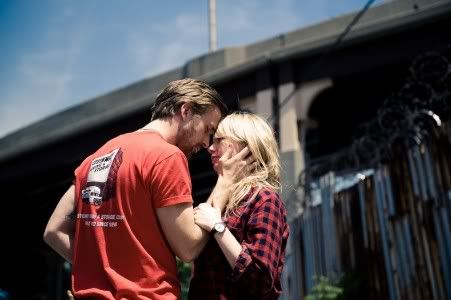Thursday, January 27, 2011
 11:11 PM |
A Pretty Postcard From Heartbreak But Not Much Else
11:11 PM |
A Pretty Postcard From Heartbreak But Not Much Else

Time has been butchered, stretched, and experimented on so many times in the movies it has ceased to become an inventive narrative device we can be at awe with. Christopher Nolan's
Memento [2000] and Gaspar Noé's
Irreversible [2002], for example, notoriously began at the end and ended at the beginning, and subsequently forced us to consider first the darkness of what's to come, only to make the seeming innocence of their beginnings become so fraught with tension and foreboding. Alejandro González Iñárritu's
21 Grams [2003] took the experiment with film time further and presents us with a story so fragmented in chronology that it is to the great service of our brains which actually were able to make sense of all that dramatic muddle.
In Derek Cianfrance's
Blue Valentine [2010], we are presented with the anatomy of a marriage, using scenes from its rosy beginning and its tattering end as complementary bookends, with a scene from one time-frame getting a strange resonance in the other. The middle part of the marriage has purposely been blotted away in the narrative, although its slow disintegration is easily read: all those absent years are there, all in tiny suffocating details that precede the end -- the quiet exasperation on the wife's face, the volcanic desperation in the husband's actions, the loss of a dog, the minefield of the kitchen, the thoughtful car rides, the devastating attempt at intimacy in a cheap "space age" motel room. Man and woman tap dance around each other, first in courtship and then in a spurt of invectives that slash and burn the remains of this marriage -- all captured in postcard-perfect cinematography by Andrij Parekh that serves more as a signal for sadness, that perhaps there is beauty even in loss and heartbreak.
It's a strange counterpoint, but it is not unwelcome. I love the sumptuousness of the film given that it is the only thing that kept me going -- because there is not much else here, really. The acting? Sure, they're perfectly well-rendered. But given a history of marriage in film that has included the razor-sharp observations of Mike Nichols in
Who's Afraid of Virginia Woolf? [1966], Stanley Donen's
Two for the Road [1967], Ingmar Bergman's
Scenes From a Marriage [1973], Woody Allen in
Husbands and Wives [1992], John Cassavettes in
A Woman Under the Influence [1974], and Ishmael Bernal's
Broken Marriage [1983] -- and perhaps even Danny DeVito's black comedy
The War of the Roses [1989] --
Blue Valentine does not present an advance. It feels like a derivative effort in new clothes, but oh, what a beautiful-looking derivative it is.
Of course everything in this film is calculated for heartbreak, and sometimes the calculation feels a little too much like ... well, calculation. In courtship, the would-be husband plays the ukelele and serenades the girl with Allan Roberts and Doris Fisher's “You Always Hurt the Ones You Love."
But of course. Alas, there is no slow burn here, no new insight to give the story a sense of tension; there is no real festering volcano that threatens to erupt and finally devastate us -- and when the final confrontation and denouement happen, they do so with a tired inevitability, and one is only too glad to have that in order to move on and finish this movie. In all, it's not really a wasted effort by the two brave actors -- Ryan Gosling as the husband and the now Oscar-nominated Michelle Williams as the wife -- who plumbed the emotional depths of their characters quite well here. They feel real, and they actually invite us to invest in their dilemma (although not by much.) I just wish they were served well by a better screenplay.
Labels: film, love
[1] This is Where You Bite the Sandwich
GO TO OLDER POSTS
GO TO NEWER POSTS

















 11:11 PM |
A Pretty Postcard From Heartbreak But Not Much Else
11:11 PM |
A Pretty Postcard From Heartbreak But Not Much Else
